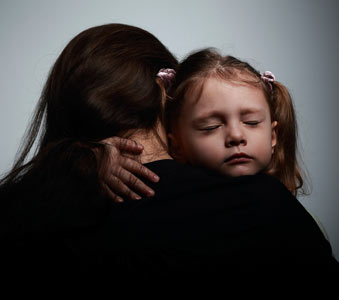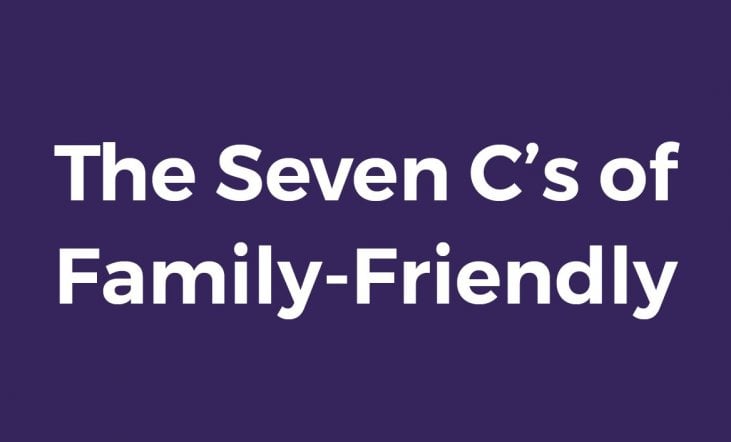Newsletter Sign Up
Regular work+family updates for
HR and diversity professionals.
My Family Care asks Martha: How does raising a child with disabilities or differences change the way you parent? What difficulties have you faced, what solutions have you discovered, and, at the end of the day, what makes your bond with your child special?
'There but for the grace of God'
In so many ways, as a family, we're incredibly lucky. A little background first. My 8 year old daughter has a genetic disorder. It's a rare one, has no name, and she is one of only about 60 known cases. As a result when she was diagnosed at 6 months of age, her doctors knew relatively little about what to expect beyond the fact that she would likely have mild to moderate learning difficulties - often a euphemism for a mental disability - and developmental delay.
The early years and not feeling alone
We'd already been through heart surgery, and she was being tube fed as she couldn't swallow safely and had severe reflux - thankfully we had wooden floors! For us, it was the not knowing what to expect that was really scary. The not knowing, together with - if I'm honest - the overwhelming sense of unfairness and 'this wasn't supposed to happen to us'.
What really helped me in the first year was finding other people with similar experiences to talk to. Unique, a charity that supports parents with children with genetic disorders, was incredibly helpful in understanding her condition. And late night visits to support forums made me feel 'not so alone'.
In the early years, we battled through endless rounds of doctors, physiotherapists, other therapists, and solved the challenges as they came. The biggest challenge was weaning her off the feeding tube, a year off work, and very little help from her doctors.
Unique to the end
My daughter is now at school - she's an August birthday, so we were able to drop her down an academic year - doing most of the things other eight year olds do. We're obviously delighted.
She's tiny, she's also dyspraxic (Developmental Co-ordination Disorder) and dyscalculic (essentially number dyslexia). She's also quirky, fearless, beyond determined - it's often her way or the highway in our household - cute as a button, and a completely unique personality. As we all are!
As her mother, I love her to bits. I love her older brother every bit as much, but just differently. I'm so proud of what she's achieved so far and the times when life has been difficult, we've struggled through it - together - so we do have a very very close bond.
Each day as it comes
It's very, very, easy to be over protective and over forgiving of behaviour that you wouldn't tolerate in a 'normal' child. It's also been easy to demand less from her than she's capable of doing. As with any child, if they can get mum to do it for them...
But, I've had my son - who just treats her as his annoying little sister and always has done - to pull me up on what he perceives (rightly so) as unfair. At the end of the day, we are lucky. She is a 'normal' child, her condition is nowhere near as severe as we were warned it might be. She has learning differences, not difficulties, and treating her with 'kid gloves' to any extent isn't a kindness for when she'll have to face the world on her own.
All that said, we still take each day/year as it comes. We still don't know what she'll be able to achieve academically or what her needs will be when it comes to secondary school. We have just moved her to a school that specialises in dyspraxia/dyslexia, as she simply wasn't able to get the specialist support she needed in a mainstream school. As a parent, you get used to just dealing with the present, but with one eye on potential solutions for challenges we have yet to face.
A steep learning curve
So, what have we learned over the years? What has my daughter and the whole parenting experience taught me? A whole lot of patience - not a natural quality of mine - to take the ups and downs as they come and, although this might sound contradictory, not to cross bridges before you come to them. I've become very resilient and relatively sceptical of so-called specialists and educationalists, I'll exempt the few amazing ones we've encountered from this comment.
In a nutshell, if we hadn't been as determined, frankly pushy and well-informed - as we've made it our business to be - my daughter would not be doing nearly so well as she is. Back to the business of parent bond, the emotional investment in battling for what we know she needs has made it very special.
Getting off 'lucky'
On a sobering note, as I said at the beginning, we're lucky. Her condition is mild, many of her issues have been resolved as she has grown older, and we've had the wherewithal to deal with it. There are many, many, families who struggle everyday with much more severe disabilities, the multiple challenges this brings to daily life, and worst of all, the lack of hope that things will get better.
Martha, Marketing Director and Mum of 2












